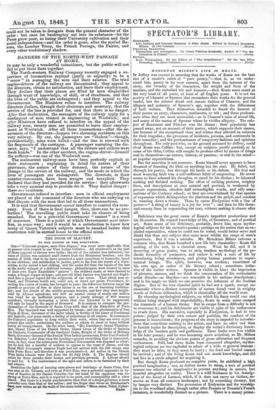THE DOOM OF SLAVERY.
TO THE EDITOR OF THE SPECTATOR.
SIB—“ L'homme propose, mais Dieu dispose," was never more applicable than at present with respect to our West Indian Colonies. All endeavours on the part of those opposed to slavery were futile; the cry of the colonist was unheeded; the voice of justice was unheard amid cheers from the Ministerial benches; and the session of 1848, that in its dawn promised a quiet conscience to humanity, bread to one children, and satisfaction to justice, gave to the first the report of a Com- mittee, to the second a bad shilling, and the scales fell from the hands of the last at the awful whisper of a deficient revenue: philanthropists were treated to some of their own Niger Expedition " palaver "; the children made, or were desired to make, a frugal supper on hope; and poor old blind Justice was hustled and fright- ened into a proper regard for the exigencies of the times. That which man re- fused, and Ministers would not, could not, or dared not grant, Providence, di- recting the course of events, has brought to pass: the difference between sugar the growth or produce of free or slave labour is on the eve of becoming tradition- ary; and the details of the middle-passage horrors, and how they were height- ened by African squadrons, and how an annual outlay of nearly one million was voted for an mefficient purpose, and a yearly average of 800 seamen sacrificed, virtually increasing a crime that was intended to be suppressed, will only be found in the pages of Hansard. It is curious to compare the pro- clamations of the Governor of Santa Cruz with that of the Executive of Porto Rico. The Spaniard was well supported by troops; and the proclamation of Don Chula di Rens, Governor of the latter island, is worthy of the times of Ferdinand and Isabella, and must excite a feeling of abhorrence in all readers. It commands the Coloured population to keep within their walls, where they are every night Penned like cattle; authorizing the soldiers or others to shoot or hang without mercy all transgressors. On the other hand, "His Excellency, Grand Chamber- lain, Grand Cross of the Danish Order, Grand Cross of the Order of Isabella the Catholic, Commander of the Gnelphic Order, Knight of the Order of Military Merit, Governor-General of the Danish West Indian possessions, Peter Carl Frederik von Scholten "—for thus runs the heading—grants everything that is demanded; more, in fact, than the subsequent Provisional Government was disposed to allow: but he had but a handful of soldiers to oppose to the mass of slaves, and the Royal Mail Company's steamer Eagle had not arrived with the 580 troops sent from Porto Rico; and therefore it was proclaimed-1. All unfree in the .Danish West India Islands were free from the 3d July 1848. 2. The Negroes should retain for three months their houses and provision-grounds. 3. Labour should be paid for. 4. The maintenance of the aged and infirm to be furnished by their late owners.
Doubtless the light of burning cane-pieces and buildings at Santa Cruz, that was seen at St. Thomas, and even at Porto Rico, was a powerful argument in fa- vour of freedom in the Danish Colonies; but the hand of the oppressor was too 5-rong at Porto Rico, and it is reported to be quiet, and consequently still a slave Island. But there is a louder proclamation than that of a despot governor, a more powerful arm than that of the soldier; and the finger that wrote at Belshazzar's *ast, now writes on all the walls of the slave-holders, Idene, mene, Tekel, Uphar-


























 Previous page
Previous page